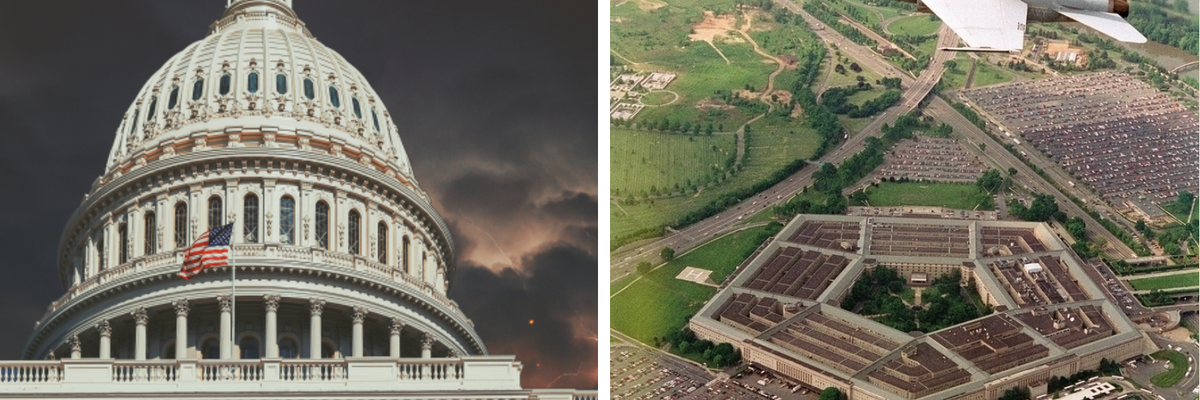The Biden administration requested $886 billion for national defense for Fiscal Year 2024, a sum far higher in real terms than the peaks of the Korean or Vietnam wars or at the height of the Cold War.
That figure could go even higher under the terms of the debt ceiling deal reached by President Biden and House Speaker Kevin McCarthy, as hawks in Congress push for an emergency package that could not only provide aid needed to defend Ukraine but also tens of billions of dollars in additional funding for the Pentagon’s regular budget.
This is a terrible idea. There is no reason to add funds to the Pentagon budget, as documented in a report released today by the Quincy Institute.
The enormous sums lavished on the Pentagon are being marshaled in support of a flawed National Defense Strategy that attempts to go everywhere and do everything, from winning a war with Russia or China, to intervening in Iran or North Korea, to continuing to fight a global war on terror that includes military activities in at least 85 countries.
Sticking to the current strategy is not only economically wasteful, but will also make America and the world less safe. It leads to unnecessary conflicts that drain lives and treasure and contribute to instability in the regions where those conflicts are waged, as occurred with the wars in Iraq and Afghanistan. In addition, elevating open–ended military commitments over other security challenges — from climate change to pandemics — risks intensifying the human and security consequences of those threats by reducing the resources available to address them.
The costs of America’s military overreach are compounded by the undue influence exerted by the arms industry and its allies in Congress, backed up by over $83 million in campaign contributions in the past two election cycles and the employment of over 820 lobbyists, or more than one for each and every member of Congress. The industry also leverages the jobs its programs create to bring lawmakers on board to fund ever higher budgets, despite the fact that the economic role of the arms sector has declined dramatically over the past three decades — from 3.2 million direct jobs to just 1.1 million today, or six-tenths of one percent of a national labor force of over 160 million people. Meanwhile, last year alone, Congress added $45 billion to the Pentagon budget beyond what the department itself requested, much of it for systems built in the states or districts of key members, a process that puts special interests above the national interest.
The United States could mount a robust defense for far less money if it pursued a more restrained strategy that takes a more realistic view of the military challenges posed by Russia and China, relies more heavily on allies to provide for the defense of their own regions, shifts to a deterrence–only nuclear strategy, and emphasizes diplomacy over the threats or use of force to curb nuclear proliferation. This approach could save at least $1.3 trillion over the next decade, funds that could be invested in other areas of urgent national need. But making a shift of that magnitude will require political and budgetary reforms to reduce the immense power of the arms lobby.
In addition to shifting to a more restrained defense strategy, a number of initial steps — some small, some major — can be taken to weaken the economic grip of the arms industry on Pentagon spending and policy.
First, top military officers and senior Pentagon officials should be barred from going to work for any military contractor that receives more than $1 billion per year from the Pentagon. At a minimum, there should be a four year ban on major contractors hiring DoD officials once they leave government, as set out in Senator Elizabeth Warren’s Department of Defense Ethics and Anti-corruption Act.
Second, the practice of the arms industry funding the campaigns of members of the armed services committees and defense appropriations subcommittees of each house of Congress should be ended. Ideally, there should be a legal ban on such contributions, but if such a measure doesn’t pass legal muster the practice should be stigmatized to the point that relevant members voluntarily forgo such donations.
And third, regional economic strategies that create civilian alternatives for heavily defense- dependent areas should be developed. Given the urgent threat posed by climate change, much of this activity can be centered on creating new hubs for the development and production of green technologies.
The Pentagon budget is headed in the wrong direction, to the detriment of our security and our economic prospects. We should redouble efforts to rein it in, led by citizen’s organizations joined by congressional leaders who are not in thrall to the military-industrial complex that President Eisenhower warned about 62 years ago.
















